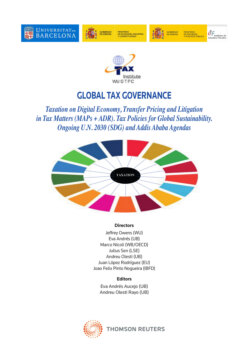Читать книгу Global Tax Governance. Taxation on Digital Economy, Transfer Pricing and Litigation in Tax Matters (MAPs + ADR) Policies for Global Sustainability. Ongoing U.N. 2030 (SDG) and Addis Ababa Agendas - Jeffrey Owens - Страница 8
На сайте Литреса книга снята с продажи.
Presentation 1 New Framework on Taxation of Digital Economy: Challenges and Opportunities of Digitalization for EU Tax Systems
ОглавлениеJeffrey Owens
Director of the WU Institute for Austrian and International Tax Law
FISC Workshop on Digital Taxation of the European Parliament,
12 February 2021
The emergence of the digital economy gives rise to a number of longer term structural issues centred around the interface between transparency, trust and technology. This chapter focuses on:
1. How does the Union get the right balance between addressing the challenges and exploiting the opportunities of digitalization for EU tax systems?
2. What is at stake for the EU in the current G20/OECD debate?
3. What criteria should the European Union use to judge any consensus that emerges?
Before answering these three questions I would like to make a general comment on the tone of the current international tax debate. Listening to the political debate you may get the impression that our current international tax arrangements are broken beyond repair. Yet the reality is that they have never worked so well: not perfect, yes there are loopholes, and yes, some countries are unhappy with the resulting allocation of revenues but general the system is working well. Why do I say that? Some facts:
We have a Forum –their inclusive framework– where almost all countries are for the first time engaged in the debate (yes some more than others but at least they have a seat at the table).
We have unprecedented cooperation between tax administrations. Multilateralism is very much alive in the tax world.
We have unprecedented dialogue between tax administration and MNES: just look at the spread of ICAP. Yes there are more aggressive audits but at least they are based upon better information and generally are based upon a common understanding of international rules. In addition the number of APA`s are increasing and MAP is working much better than in the past.
Tax Transparency has become the new norm. Yes, it can be painful being in full glare of the sunlight but more transparency will lead to more trust and in the longer term less tax populism.
At the same time our tax systems are on the brink of a transformation coming from new technologies: those we know (AI, ML) and those we are still trying to understand (e.g. Blockchain, quantum computing). I am convinced that these will eventual lead to what the OECD has called the invisible tax administration, an audit and return free tax environment; with real time compliance; with tax administrations being certifiers of systems (inputs) rather than verifiers of outcomes.
Let me now try to answer the three questions that I posed at the beginning of this chapter.
